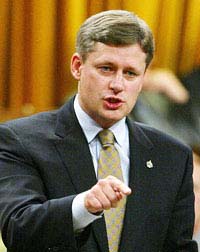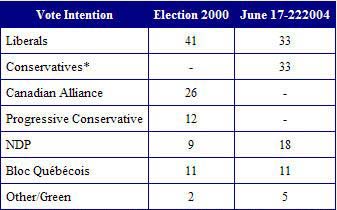 |
|
|
Earlier today, in conversation with three friends in three different locations, VanRamblings found itself raucously chastised for choosing not to cast a ballot for the Conservatives in the upcoming election (makes one wonder as to whether any one of these ‘friends‘ had been reading VanRamblings’ Decision Canada coverage over the course of the past month).
While engaged in these three conversations, VanRamblings queried each friend as to whether each had read the Demand Better Conservative platform document. Turns out that not only had none of these friends read the document; each was unaware of its existence (did VanRamblings mention that these friends are educated professionals?).
During the course of these friendly (but often bewildering) series of exchanges, VanRamblings raised issues of concern with each individual, ranging from the Conservative party’s position on the independence of the Supreme Court (they’re agin it), to the Tory position on the arts and the CBC (virtually non-existent, and agin it again). Turns out that each of these friends are voting for the Conservatives for no reason other than the fact that the Conservatives represent the political party their families had always cast a ballot for, dating back generations.
So, as per the headline for today’s posting, and in anticipation of what would seem to be an assured Conservative minority government come next Tuesday morning, for my friends and for VanRamblings readers, over the course of the next five days, leading up to the election Monday, June 28th, VanRamblings will explore in depth reasons to be concerned about a Conservative government taking power in Ottawa, just what kind of Canada we’re likely to see with a Tory regime in power in the nation’s capital, and why VanRamblings will be casting an Anybody But Harper ballot.
We begin today with the Tory position on legal affairs and the judiciary.
Tory Platform A ‘Legal Minefield’
 Would you trust this man with your country? |
According to an article that appeared in CanWest newspapers earlier in the week, “the Conservative platform is a legal minefield that contains at least 12 items that either violate the Charter of Rights, are ripe for serious court challenges or would require amendments to the Constitution.”
The Tory party’s plan to stop federal prisoners from voting, ban gay marriage and eliminate artistic merit as a defence for owning child pornography are blatant Charter of Rights violations, a group of constitutional experts told CanWest’s Janice Tibbetts.
Repealing the ‘faint hope’ clause that allows prisoners serving life sentences to apply for early parole after 15 years; imposing consecutive instead of concurrent sentences for people convicted of multiple offences; declaring an individual a dangerous offender after committing a third violent or sexual offence, thus mandating an indefinite jail sentence; and requiring violent or serious repeat offenders who are 14 or older be tried in adult court instead of youth court would most certainly result in a Charter of Rights challenge to the proposed Conservative ‘legal agenda’.
“Offenders under the Charter have all kinds of protections,” noted Lorraine Weinrib, a University of Toronto law professor.
The Tories have also said that a Conservative government would require a litmus test for appointments to the Supreme Court, and would move towards an elected, American-style Senate, both initiatives requiring amendments to the Constitution. Any constitutional change would need approval of seven provinces with at least 50 per cent of the population — a threshold that has proven thus far to be virtually unattainable.
More Decision Canada coverage of this issue is available here.
And The Polls Just Keep on Comin’
With Election Day now just five days away, a poll released today by the Environics Research Group shows the Liberals and Conservatives are locked in a dead heat with a minority government an increasingly likely outcome.
The survey of 1500 adult Canadians shows the Liberals and the Conservatives each with the support of 33 percent of decided voters. The NDP is running third with 18 percent of the national popular vote, and the Bloc Québécois is at 11 percent nationally. Four percent would vote for the Green Party and one percent would support other parties. Twenty percent of eligible voters remain undecided.
Comparing these survey results to the popular vote in the 2000 election, Liberal support has dropped eight percentage points from 41% to 33%. Support for the Conservative Party, while higher than the vote for the Canadian Alliance alone in 2000, is five points lower than the 38% that the Canadian Alliance and the federal Progressive Conservative parties received between them in 2000. Support for the NDP has doubled since the 2000 election, rising from 9% to the current 18%.
 |
In analyzing Environics’ results in comparison with the popular vote results of the last election in 2000, voting patterns in Québéc, Ontario and British Columbia have shown the greatest volatility. Liberal support in Québéc is 19 points lower than in 2000. While the Liberals still lead in Ontario with 40%, their support has fallen by 12 points in Ontario and that loss has been matched by an 11% increase in NDP support to 19%.
British Columbia stands out as the region where the survey results show the most dramatic change compared with 2000. Conservative support is 22 points lower and NDP support is 20 points higher than in 2000, confirming results released by the Mustelgroup Monday.
Headlines of The Day
Alberta promises reforms won’t violate Canada Health Act: A news release issued by Alberta Premier Ralph Klein’s office today did an about face on its much-touted new health policy by taking a less aggressive stance on privatization and users fees. Alberta Health Minister Gary Mar told reporters, “We are not moving forward on any privatization. The money is all going to public health care, nothing of which will violate the Canada Health Act.”
Martin: Party with most seats ought to form government: According to a Canadian Press story, Paul Martin appears to have given up the idea of clinging to power if he wins fewer seats than the rival Conservatives in Monday’s election, saying common sense dictates the party with the most MPs should form the government. “It’s a common sense proposition that the party that has the most seats is the party that certainly ought to form a government,” Martin told an Edmonton audience this afternoon.
 |
Advance poll voter turnout double that of 2000: As the leaders head into the final days of the campaign, they now know that a large part of the population has already made up its mind and acted on that choice. Elections Canada reports that 1.244 million people voted in the advance polls that were held last Friday, Saturday and Monday, a whopping 60 per cent increase over the 775,000 who voted in advance in 2000.